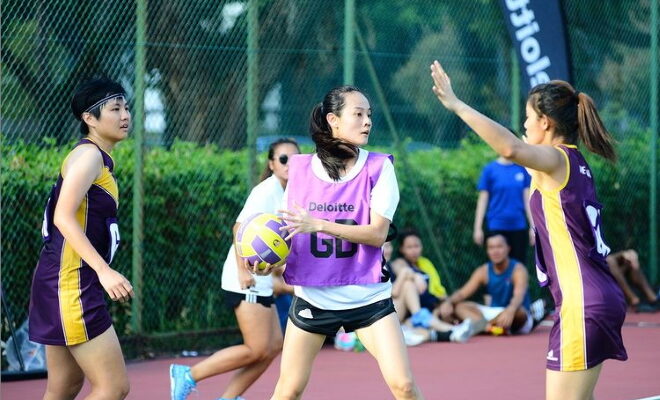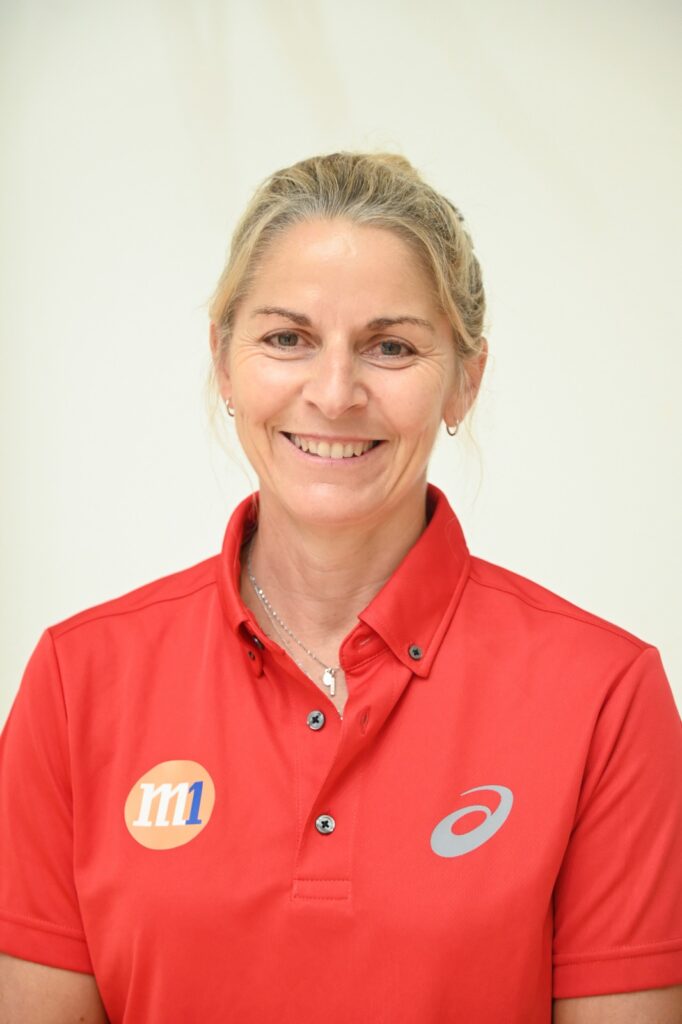
Insights + interviews
#ChoosetoChallenge with a Sound Mind Sound Body
For IWD 2021, ASICS shares about their ‘Sound Mind Sound Body’ theme and how it supports the attitudes and motivations behind Singaporean female athletes from the Singapore National Netball Team.
These female athletes stay on top of their game by embracing a balance of body and mind that keeps them ready and able to face the challenges and joys of each day.
Some are juggling professional careers as well as training and competing professionally. What are their daily battles like? How do they motivate themselves to continue competing? What defines strength to them?
Annette Pearce, Head Coach of the National Netball Team shared with us her entry into netball, how the pandemic impacted her and lessons learnt.

the Active Age (AA): Can you share about your background and what you do away from Netball?
Annette Pearce (AP): Before being appointed as Singapore’s National Netball Coach in January 2020, I had been involved with the national squad over a period of 10 years as a performance analyst.
Born and raised in New Zealand, sport has always been a passion for me. Instilled at a very young age due to my parents being active and a desire to have a career in sport, it has given many opportunities to hold various roles, such as being the Sport Wanganui Regional Sports Development Director, Western Netball Regional Manager (NZ), Head of Sport and Rowing at private girls schools both in NZ and Perth, whilst still being involved heavily in netball.
I am a proud mum of two adult children with the eldest son in New Zealand and a daughter in Perth. They are very active and have a love for the outdoors, both in sport and recreational fun.
Away from netball, I also spend time with family and friends. This includes walking our ‘family furry member’ Bear, exercising and reading when we’re back in Perth.
AA: How did you get started with netball, and what made you decide to go professional?
AP: There has always been a passion and love for the game and I remember at a young age being at the courts, watching my mum play. I had opportunities to play a variety of sports but netball remained a constant, playing up to a national level.
Nearing my end of playing I had started to coach as I wanted to give back to the sport that had given me joy and so many opportunities.
Starting out as a junior coach, the desire to increase my knowledge and experience in coaching to ensure I was able to enhance and help players grow became a focus once I retired from playing. In addition, there was also that desire for me as a coach to see what levels I could reach.
Professionalism did not come in when I started out as a coach as it was about passion and giving back (which still remains). Going professional as a coach really happened through an opportunity when I was offered to coach in one of the first semi-professional National League Competitions.
Gaining valuable experience, knowledge and mentoring, I was fortunate to be involved in Netball New Zealand’s High Performance Program as an elite coach — coaching New Zealand Secondary Schools, assistant NZ teams and Pulse (a franchise team).
Coaching at any level is not easy, especially at an elite level, so I believe that maintaining a healthy balance both physically and mentally is important to ensure that I am a better person for it.
AA: Has the pandemic changed your outlook about career, sports, or family?
AP: The pandemic has put into perspective the importance of sports and its positive impact on the mind. As a coach, I have realised how important it is to ensure that my athletes continue to maintain both a sound mind and sound body through sport.
Comparing my previous approach to coaching, adapting has been a big change to the challenges that I have not had to face as a coach before. However, my philosophy has not changed and I remain committed to enhancing and aiding athletes to be the best they can, whilst making it positive and enjoyable environment. It is about collaboration and empowering the athlete through fostering a strong and trusting team culture.
Arriving here in January 2020, a plan had been laid out to ‘raise the bar’, whilst ensuring the best support for the squad both physically and mentally was put in place to be their best on and off the court, competitive on the international stage, and with an ultimate goal to be the best in Asia.
With Phase 3 of the pandemic being announced, the focus of the plan remained the same. However, how we have collectively continued to train the squad from the onset of the pandemic both physically and mentally has certainly changed, which has been a challenge for us all. The hardest challenge to begin with was the start of Phase 3, as the newly announced young squad were unable to train collectively for both strength and conditioning or court, and trainings had been shifted to zoom until further notice.
There were rising concerns surroundings the athletes’ well-being both physically and mentally as nothing like this had been experienced before. Thankfully, I am very privileged to work alongside a very supportive management team comprising of a manager, assistant coach, fitness trainer, sports psychologist, nutritionist and medical team, who collectively worked together to ensure that the support and needs of each individual were taken care of.
For example, strength and conditioning sessions were conducted via zoom and the athletes were using a variety of items within their homes to act as weight. Mediation and ‘Town Hall’ meetings were held for mental wellbeing, allowing for interactions in group chat rooms, as well as individual check-ins. The leadership group was instrumental in setting up little pod groups to ensure that no one was alone. The key word was ‘support’ and knowing that we were here for each other.
With all the support mechanisms in place, the one thing that the players did crave was the physical presence, while also acknowledging that it was becoming mentally tough. Many discussions were held in “yes we can see you all on zoom but we just want to be out there doing it physically together, but this will make us stronger”.
There are of course restrictions still in place that lay out what can and cannot be done. However with the potential to be able to train in up to groups of 8, it certainly has been beneficial for boosting their well-being.
The pandemic has certainly affected the balance for me, especially with family, as I am unable to fly back home to either Perth or New Zealand to spend valuable time with my family. Thankfully, technology has helped bridge the gap in some form to have that contact. Being active, such as a routine run (well plod in my terms) or just a recreational walk or cycle certainly helps clear the mind and gives that sense of achievement, boosting me both physically and mentally.
As a national coach, it has certainly presented its challenges like I have never experienced before — I’ve had to think outside the box, bring new ideas or ways to keep motivating the squad so that when the potential opens up for us to play, we need are on top of our game.
AA: What lessons did you derive from training and competing during the pandemic?
AP: There have been many lessons that I have derived and continue to gain from training during this time. This include how to conduct multiple trainings via zoom, how to continue to make them interesting and challenging, and how to continue to push the squad now that we have gone from only 5 people on the court to a group of 8.
Additionally, this is especially so in what I as a coach and the team can do better – so it involves reviewing, rethinking and working together.
AA: What does balance mean to you, both professionally, through sports and with your family?
AP: Balance to me means maintaining both a healthy mind and a healthy body, and having to juggle between my profession, family and other aspects of my life can be demanding.
More and more, I have realised the importance of ensuring that both my mental and physical well-being are being equally taken care of.
I do this in a number of different ways, by having a routine each morning, whether it be a run/walk or a personal home training program with an array of music to keep the motivation up, or even just picking up the telephone to talk and have a laugh — whether in Perth or New Zealand.
For me, when finding that balance proves to be challenging I think about what I can change or do to potentially ensure that I regain the balance. This is why ASICS’ ‘Sound Mind Sound Body’ tagline resonates strongly with me, as it is an important reminder to take care of myself amidst everything going on in life.
In sport especially, it’s important to focus on both the match as well as what is required of me in the team. As such, it is important to ensure that all aspects of my life are well-rounded and taken care of (at least to the best of my abilities) as any pressing issues or problems may affect and distract me on the court.
- Photo credit: Netball Singapore Instagram
- Photo credit: Annette Pearce through ASICS






